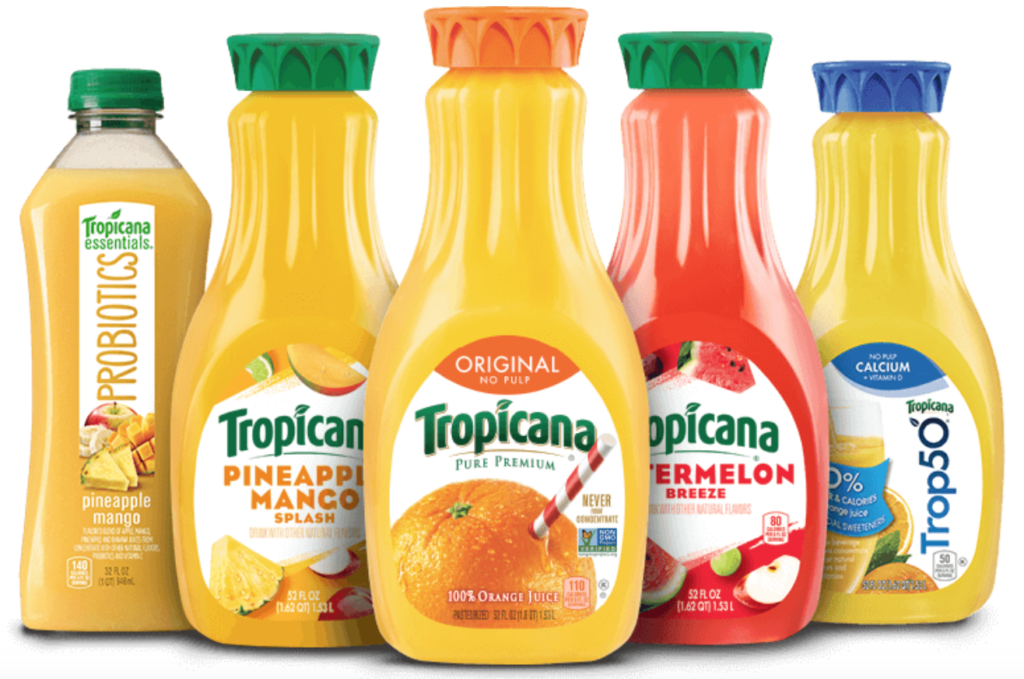PepsiCo announced yesterday it would be selling Tropicana, Naked and other North American juice brands to private equity firm PAI Partners in a $3.3 billion deal. The beverage giant will keep a 39 percent non-controlling stake in a newly formed joint venture in the deal with PAI, meaning it will retain a minority ownership with no control over decisions. In addition, PAI will have the irrevocable option to purchase some of PepsiCo’s European juice businesses.
PepsiCo chairman and CEO Ramon Laguarta said in a press release that the deal, “will free us to concentrate on our current portfolio of diverse offerings, including growing our portfolio of healthier snacks, zero-calorie beverages, and products like SodaStream which are focused on being better for people and the planet.” The sale is expected to be completed in late 2021 or early 2022.
The deal reflects the beverage industry’s doubts about the demand for fruit juice as consumers seek healthier, low- to no-sugar options. As such, PepsiCo plans to focus and innovate around a smaller core of brands and categories, including water, coffee, energy drinks and its staple carbonated soft drinks. The company said that it will use the earnings from the sale to “strengthen its balance sheet and invest back in its business,” according to the same press release.
Aside from focusing on healthier and primary categories, PepsiCo’s decision to sell its juice business was financial as well. Tropicana, Naked and PepsiCo’s other juice businesses brought in approximately $3 billion in net revenue last year. While that figure might sound considerable, its operating profit margins were below the company’s overall operating margin in 2020, forcing it to rethink its juice portfolio.
Related: PepsiCo is Expanding its Scope in the Cocktail Mixer Market with Unmuddled
Despite health trends brought on by the COVID-19 pandemic, US juice sales volumes increased last year as more consumers ate breakfast at home and sought the immunity benefits of vitamin C. But that was just a momentum-boosting blip in a broader decline. Overall juice sales fell three percent between 2015 and 2020, according to data from Euromonitor International.
By the gallon, North American juice consumption peaked in 2003 at 4.2 billion gallons. But by 2017, that number dropped to three billion. On an individual basis, Americans consumed 5.8 gallons of juices per capita in 2018, down from 6.9 gallons in 2013. Notably, PepsiCo-owned Tropicana Pure Premium was the leading orange juice brand in the US in 2017.
This notable decade-and-a-half-long decline has put pressure on food and beverage giants to shift away from sugary drinks and toward lower-calorie and lower-sugar offerings. PepsiCo’s rival Coca-Cola exemplified this by shedding juice brands including Odwalla and Zico, over the last year so it can focus on stronger performers. But for now, Coca-Cola is holding on to its successful juice brands Minute Maid and Simply.
PepsiCo originally bought Tropicana in 1998 and the Naked juice brand about ten years later. By 2018, the company was shifting directions when it bought the carbonated drink machine company SodaStream for more than $3 billion. It also acquired Rockstar Energy Beverages last year for $3.85 billion, further lamenting its change in direction.












Join or login to leave a comment
JOIN LOGIN